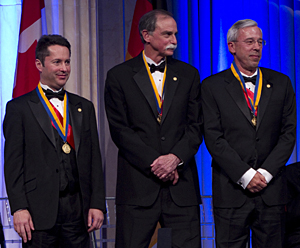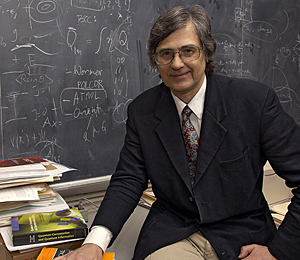

ADVERTISEMENT
- Rozovsky wins prestigious NSF Early Career Award
- UD students meet alumni, experience 'closing bell' at NYSE
- Newark Police seek assistance in identifying suspects in robbery
- Rivlin says bipartisan budget action, stronger budget rules key to reversing debt
- Stink bugs shouldn't pose problem until late summer
- Gao to honor Placido Domingo in Washington performance
- Adopt-A-Highway project keeps Lewes road clean
- WVUD's Radiothon fundraiser runs April 1-10
- W.D. Snodgrass Symposium to honor Pulitzer winner
- New guide helps cancer patients manage symptoms
- UD in the News, March 25, 2011
- For the Record, March 25, 2011
- Public opinion expert discusses world views of U.S. in Global Agenda series
- Congressional delegation, dean laud Center for Community Research and Service program
- Center for Political Communication sets symposium on politics, entertainment
- Students work to raise funds, awareness of domestic violence
- Equestrian team wins regional championship in Western riding
- Markell, Harker stress importance of agriculture to Delaware's economy
- Carol A. Ammon MBA Case Competition winners announced
- Prof presents blood-clotting studies at Gordon Research Conference
- Sexual Assault Awareness Month events, programs announced
- Stay connected with Sea Grant, CEOE e-newsletter
- A message to UD regarding the tragedy in Japan
- More News >>
- March 31-May 14: REP stages Neil Simon's 'The Good Doctor'
- April 2: Newark plans annual 'wine and dine'
- April 5: Expert perspective on U.S. health care
- April 5: Comedian Ace Guillen to visit Scrounge
- April 6, May 4: School of Nursing sponsors research lecture series
- April 6-May 4: Confucius Institute presents Chinese Film Series on Wednesdays
- April 6: IPCC's Pachauri to discuss sustainable development in DENIN Dialogue Series
- April 7: 'WVUDstock' radiothon concert announced
- April 8: English Language Institute presents 'Arts in Translation'
- April 9: Green and Healthy Living Expo planned at The Bob
- April 9: Center for Political Communication to host Onion editor
- April 10: Alumni Easter Egg-stravaganza planned
- April 11: CDS session to focus on visual assistive technologies
- April 12: T.J. Stiles to speak at UDLA annual dinner
- April 15, 16: Annual UD push lawnmower tune-up scheduled
- April 15, 16: Master Players series presents iMusic 4, China Magpie
- April 15, 16: Delaware Symphony, UD chorus to perform Mahler work
- April 18: Former NFL Coach Bill Cowher featured in UD Speaks
- April 21-24: Sesame Street Live brings Elmo and friends to The Bob
- April 30: Save the date for Ag Day 2011 at UD
- April 30: Symposium to consider 'Frontiers at the Chemistry-Biology Interface'
- April 30-May 1: Relay for Life set at Delaware Field House
- May 4: Delaware Membrane Protein Symposium announced
- May 5: Northwestern University's Leon Keer to deliver Kerr lecture
- May 7: Women's volleyball team to host second annual Spring Fling
- Through May 3: SPPA announces speakers for 10th annual lecture series
- Through May 4: Global Agenda sees U.S. through others' eyes; World Bank president to speak
- Through May 4: 'Research on Race, Ethnicity, Culture' topic of series
- Through May 9: Black American Studies announces lecture series
- Through May 11: 'Challenges in Jewish Culture' lecture series announced
- Through May 11: Area Studies research featured in speaker series
- Through June 5: 'Andy Warhol: Behind the Camera' on view in Old College Gallery
- Through July 15: 'Bodyscapes' on view at Mechanical Hall Gallery
- More What's Happening >>
- UD calendar >>
- Middle States evaluation team on campus April 5
- Phipps named HR Liaison of the Quarter
- Senior wins iPad for participating in assessment study
- April 19: Procurement Services schedules information sessions
- UD Bookstore announces spring break hours
- HealthyU Wellness Program encourages employees to 'Step into Spring'
- April 8-29: Faculty roundtable series considers student engagement
- GRE is changing; learn more at April 15 info session
- April 30: UD Evening with Blue Rocks set for employees
- Morris Library to be open 24/7 during final exams
- More Campus FYI >>
12:27 p.m., May 28, 2010----On April 29 in Philadelphia, the University of Delaware joined The Franklin Institute in co-sponsoring a symposium in honor of the winners of the 2010 Benjamin Franklin Medal in Physics -- J. Ignacio Cirac from the Max Planck Institute for Quantum Optics; David Wineland of the National Institute of Standards and Technology; and Peter Zoller from the University of Innsbruck.
The scientists received the awards “for their theoretical proposal and experimental realization of the first device that performs elementary computer-logic operations using the quantum properties of individual atoms.”
Krzysztof Szalewicz, professor of physics and astronomy at UD, organized the symposium on quantum computing held at the University of Pennsylvania in the scientists' honor. A member of the Franklin Institute's Committee on Science and Arts, Szalewicz was the “prosecutor” of the case that resulted in the scientists' selection for the awards. The committee selects candidates from all over the world in an extensive process aimed at recognizing those scientists and engineers “who lead their fields, expand knowledge, challenge standards, and serve humanity.”
As described on the Franklin Institute website, in 1994, Cirac and Zoller proposed an experiment to construct a quantum computing device, which explicitly utilized quantum effects to perform computational functions. The quantum objects were cold trapped ions.
General ideas of quantum computing had been discussed for several years -- the idea of using quantum objects to create a computer with entirely new powers was first suggested in the 1980s by the American physicist Richard Feynman. Not only would a quantum computer be very powerful, but it would allow for solving problems that a typical binary computer could not (within a reasonable amount of time) since quantum effects allow for the simultaneous processing of many possible answers to a logical question, as opposed to considering them sequentially.
Cirac and Zoller's concrete description of a realistic quantum logic gate, the fundamental device in the computer that operates logic functions, included such meticulous detail that David Wineland and co-workers were able to build their machine within a year. It was the first demonstration of computer logic functions that exploited the laws of quantum mechanics at the level of individual atoms, thus establishing that quantum computing -- with its potential for much more powerful computers -- may be possible.
Several University of Delaware faculty serve on the Franklin Institute's Committee on Science and the Arts. The committee's mission is to sustain the scientific character of the institute through its investigation of worldwide scientific and technological achievements and its recommendation for the awarding of the Benjamin Franklin Medal in the fields of chemistry, computer and cognitive science, earth and environmental science, engineering, life science, and physics.
Stuart Pittel, professor of physics and astronomy and director of the Bartol Research Institute at UD, currently chairs the awards committee, and Pamela Green, Crawford H. Greenewalt Endowed Chair in Plant Molecular Biology, is in charge of planning.
Other UD committee members include Thomas Gaisser, the Martin A. Pomerantz Chaired Professor of Physics and Astronomy; Klaus Theopold, chairperson of the Department of Chemistry and Biochemistry; and John Wehmiller, professor of geological sciences.
The Franklin Institute was founded in Philadelphia in 1824 originally for the purpose of honoring Ben Franklin and advancing the usefulness of his inventions. Today, the institute's mission is to inspire an understanding of and passion for science and technology learning.
The Franklin Institute Awards, also founded in 1824, are among the oldest and most prestigious science awards, with winners recognized for their ground-breaking contributions to science.
Article by Tracey Bryant


